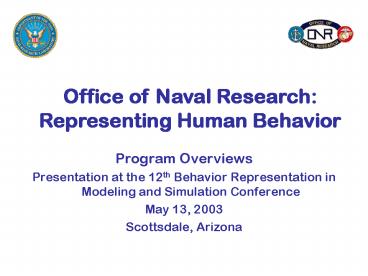Program Overviews - PowerPoint PPT Presentation
1 / 13
Title:
Program Overviews
Description:
... of functional abstraction to increase model development efficiency (Zachary/CHI) ... Man machine interface (human factors) Communication (verbal and non-verbal) ... – PowerPoint PPT presentation
Number of Views:38
Avg rating:3.0/5.0
Title: Program Overviews
1
Office of Naval Research Representing Human
Behavior
- Program Overviews
- Presentation at the 12th Behavior Representation
in Modeling and Simulation Conference - May 13, 2003
- Scottsdale, Arizona
2
From 6.1 through 6.3
- Affordable Human Behavior Modeling
- Harold Hawkins hawkinh_at_onr.navy.mil
- Ruth Willis willisr_at_onr.navy.mil
- Virtual Technologies and Environments
- LCDR Dylan Schmorrow schmord_at_onr.navy.mil
- Denise Nicholson denise.nicholson_at_navy.mil
3
Motivation
- Software proxies for human action and thought are
ubiquitous across models and simulationshowever
costs for development remain high. - ONR has refocused its Human Behavior Modeling
programthe emphasis is now on
Human Behavior Modeling
affordable
4
A Moment of History
- BAA 02-020 opened in the summer of 2002
- Topics of interest included
- Multi-agent architectures for modeling human
behavior - Techniques to facilitate knowledge
acquisition/engineering - Learning strategies to refine models through
experience - Self-explanation for verification,
trouble-shooting training - Architectures to facilitate re-use of models or
components - Techniques to enable robustness
5
FY2003 Technical Highlights
- Developing a testbed for the evaluation of
HBR-based teammates (Campbell, Buff
Bolton/NAVAIR Orlando) - Introducing a psychologically-inspired forgetting
mechanism to Soar (Chong/GMU) - Examining behavior underpinnings of current
gaming products (Ferguson/BBN) - Developing model traceability tools to support
development, VV, and post-deployment (Harper
Zacharias/CRA) - Automated conversion of a mission behavior to an
executable CGF entity behavior (Harvey/BMH) - Developing a high level modeling language to
support compositional reuse (John/CMULewis/UMICH
Matessa, Remington Vera/NASA) - Advanced visualization technique enables HBMs to
self explain for coaching, AAR, validation
(Jones/Soar)
6
FY2003 (2 of 3)
- Applying HCI methods to make model authoring
tools more usable and useful (Koedinger/CMU
Heffernan/WPI) - Exploring diagram-based tools as basis for
generating rules (Laird/UMICH Pearson/ThreePenny
SW) - ACT-R/PM extended to represent realistic
adversaries to train USMC fire teams in MOUT
environments-via VIRTE (Lebiere/CMU, MAD) - Combining case-based memory and genetic
algorithms to improve decision support
(Louis/UNV McDonnell/SPAWAR) - Examining Case-Based Reasoning technology as a
means to reduce development time (McCormack
Reece/SAIC Aha McLaren/NRL) - Recovery-from-error strategy significantly
reduces brittleness in HBMs (Nielsen/Soar) - Developing a formal theory of semantic
composability (Petty/ODU)
7
FY2003 (3 of 3)
- Developing a high level behavior representation
language with the context of Soar (Ritter/PSU) - Hybrid (EA, ACT-R) matches humans in high level
control of multiple UAVs (Schultz Trafton/NRL) - Applying RETSINA multi-agent architecture to CGF
code fragments to enable reuse (Sycara/CMU) - Unified calculus enables reasoning by HBMs (and
decision support systems) facing disparately
represented, uncertain, incomplete information
(Yager/IONA) - Utilizing hierarchies of functional abstraction
to increase model development efficiency
(Zachary/CHI)
8
Looking toward 2004
- Just completed the first AHBM program review,
April 24-25 2003 - Bravo Zulu!
- New white papers are invited through July 31.
Submit these electronically to - hawkinh_at_onr.navy.mil and willisr_at_onr.navy.mil
9
Motivation
- Develop and demonstrate leap ahead
human-immersive technology for Naval training - Supplement complement live training using
virtual wargaming simulations
10
VIRTE Demo IAmphibious Assault Triad
- Demo I addresses integrated training for the
triad of Naval Amphibious Assault Vehicles - LCAC
- AAAV
- MV-22
Advanced Amphibious Assault Vehicle (AAAV)
Human Centric Design Approach CTA HCI
Functionality Analysis Performance
Measurements Effectiveness Experiments Networked
Virtual Environment Multi-modality (visual,
aural, haptics) Near field Interactions
Distributed Interactions Intelligent Agents
(CGF) Intelligent Tutors Integration into the
JSB Integration with Exercise Support Tools
Landing Craft, Air Cushion (LCAC)
Military Operations in Urban Terrain (MOUT)
11
VIRTE Demo II CQB for MOUT
- Locomotion Platforms
- Accurate tracking systems for both humans
and weapons - Visual Display Systems
- Weapon modeling, to include weapons available at
the squad level, to include indirect fire weapons
and crew-served weapons - Interoperability (HLA compliant)
- Realistic and intelligent Computer Generate
Forces (CGF) - Man machine interface (human factors)
- Communication (verbal and non-verbal)
- Rapid database generation, dynamic terrain and
structures
12
Human Behavior within VIRTE
- Demo I - Modular Automated Instructional System
- Demo I - Synthetic Teammate
- Demo II - Intelligent Adversaries
- Intelligent tutoring techniques for intelligent
computer-aided instruction - Intelligent teammates and adversaries for
sim-based training and mission rehearsal
13
- Virtual Technologies and Environments
- For more info on the program...
- www.virte.org
- Submit white papers (1-3 pages) by 30 May to
both - Program Manager LCDR Dylan Schmorrow, Ph.D.
- schmord_at_onr.navy.mil
- Office of Naval Research
- Advanced Development Manager Denise Nicholson,
Ph.D. - denise.nicholson_at_navy.mil
- NAVAIR Orlando















![Overview of the Title I Program at [school name] PowerPoint PPT Presentation](https://s3.amazonaws.com/images.powershow.com/7080086.th0.jpg?_=201508240110)















